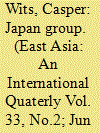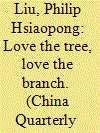| Srl | Item |
| 1 |
ID:
145660


|
|
|
|
|
| Summary/Abstract |
In the new Cold War context of the early 1950s, when the People’s Republic of China and Japan had no official relations, Chinese Premier Zhou Enlai developed his so called People’s Diplomacy; a strategy of creating informal channels between China and Japan that could serve to build a network of personal ties outside the immediate government sphere, ties that would ideally become so strong they would result in official diplomatic relations. A central position in this strategy was reserved for the Japan Group; an unofficial network drawn from different foreign policy organs, centered on Zhou Enlai’s close confidant Liao Chengzhi, which was to manage Zhou’s Japan policy. This group, many of whom had a background in intelligence work, was charged with training the Chinese government’s Japan specialists, managing all interactions with Japanese, as well as with actively cultivating ties with a wide variety of Japanese, especially outside of Japanese leftist circles. This article traces the establishment and inner workings of the Japan Group in the 1950s, based on published records of, and interviews with, group members. The main focus is on the core of the group, made up of a small number of trusted Japan hands around Liao Chengzhi. Since this same core group of people was involved in all interaction with Japanese, they provided the continuity necessary for cultivating the informal personal ties that had to lead to the long-term goal of Sino-Japanese rapprochement. This networking process, which transcended the immediate concerns of particular negotiations and exchanges, will also be explored.
|
|
|
|
|
|
|
|
|
|
|
|
|
|
|
|
| 2 |
ID:
173861


|
|
|
|
|
| Summary/Abstract |
Chinese national identity has long been considered to have been an obstacle to Singapore's nation-building efforts. This is mainly because China was suspected of using its ethnic links to encourage Singapore's communist rebellions during the 1950s and 1960s as Lee Kuan Yew was working towards establishing the city state. This study reviews Lee's exchanges with Beijing and argues that he gave China the impression that he was building an anticolonial, pro-China nation. Beijing therefore responded positively to Lee's requests for support. Reiterating its overseas Chinese policy to Lee, Beijing sided with him against his political rivals and even acquiesced in his suppression of Chinese-speaking “communists.” In addition, China boosted Lee's position against Tunku Abdul Rahman, supported Singapore's independence and lobbied Indonesia to recognize the territory as a separate state. China thus actually played a helpful role in Singapore's nation building.
|
|
|
|
|
|
|
|
|
|
|
|
|
|
|
|